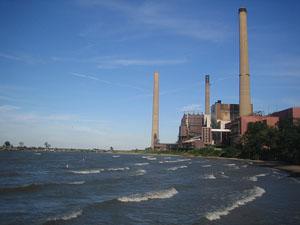Lawmakers weigh jobs, environment
A power plant on Lake Erie (Image: Bien Stephenson, Creative Commons)
Talk to an Ohio Democrat in Congress about climate change, you are likely to hear some variation of "it’s a real problem, but …"
Congressman Zack Space: "The question is how do we address it responsibly."
Congressman Space sits on the House Energy Committee, which has sent out a draft bill addressing global warming. That document fills over six-hundred pages. But here’s a summary: renewable energy like wind and solar would be the winners. Fossil fuels like oil and coal — not so much. Space is afraid that the deck is stacked against Ohio.
Space: "I come from a state that generates about 90 percent of its electricity from coal. I come from a state that has been heavily reliant upon manufacturing and its economic base, and it has seen an unfortunate decline in that manufacturing base in the last 12 years."
The bill’s centerpiece is a cap and trade system. The cap is a nation-wide emissions limit set by the government. It would decline each year so that by 2050, the US would generate eighty percent fewer emissions than in 2005. Most US companies would have to get emissions permits from the government. And those who emit less can sell their credits on a carbon market. In such a system, energy intense industries could be hit by a double whammy — bigger utility bills plus the cost for CO2 permits.
Senator Sherrod Brown: "Ohio has virtually all of them — glass, steel, chemicals, cement, aluminum is another."
Ohio Democratic Senator Brown has already been waging a war against outsourcing of manufacturing jobs. He says he’s worried that even more factories will move to China or India to avoid paying for carbon emissions.
BROWN: "We also have to set an international board — either board or equalization, or some sort of trade regiment here that doesn’t put our businesses or our manufacturers at a disadvantage."
Brown says that he wants to supports cap and trade. If Washington designs the bill carefully, he sees a boom of solar panel factories and wind turbine producers across Ohio.
Republican Congressman Steve LaTourette also says he’s all about reducing greenhouse gas emissions. But he’s worried that steep cuts would sock consumers hard: "It appears that they are declaring a war on Ohio and Indiana because you can get the cap stuff in place but people aren’t going to sit still for their electric bills going through the roof and everything else."
Democrats are already looking for sweeteners to woo industrial state lawmakers. The House bill has huge subsidies for clean coal. And its authors are working to give free permits to some manufacturers and compensation to consumers. House Democrats will hammer away at these details in the coming weeks. Republicans, however, see an opening.
Oklahoma Congressman Tom Cole is a member of the GOP leadership team: "The Democratic coalition is very weak. They are going to have a very hard time achieving unity on their side in the House, and I think it will be even worse in the Senate."
But even if Republicans manage to keep Democrats divided, the administration can regulate carbon dioxide through an existing law. President Barack Obama has not ruled out that plan, but said he prefers lawmakers to craft their own compromise.
Yanmei Xie filed this report for Capitol News Connection in Washington.
Created by Bureau Chief and Executive Producer Melinda Wittstock, Capitol News Connection from PRI provides insightful, localized coverage of participating stations’ congressional delegations.
